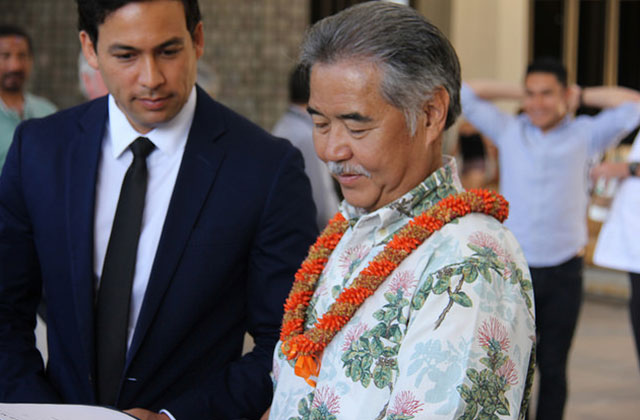Hawaii Gov. David Ige signed two bills yesterday (June 6) to enforce parts of the Paris Agreement—making Hawaii the first state to take concrete action in support of the international climate agreement.
“Hawaii is committed to environmental stewardship, and we look forward to working with other states to fight global climate change. Together, we can directly contribute to the global agenda of achieving a more resilient and sustainable island Earth,” said Ige, in a press release.
Senate Bill 559 expands the state’s strategies and efforts to reduce greenhouse gas emissions. This will be through energy use reduction, renewable energy adoption and air pollution control from all areas, including transportation.
“Such strategies and mechanisms shall utilize the best available science, technologies and policies to reduce greenhouse gas emissions and shall be closely aligned with the climate change principles and goals adopted in the Paris Agreement and Hawaii’s share of obligations within the expectations apportioned to the United States in the Paris Agreement, regardless of federal action,” the bill states.
The second bill, House Bill 1578, is focused on carbon, the most prominent greenhouse gas behind climate change. It establishes the Carbon Farming Task Force, which would look at agricultural and aquacultural practices that would improve soil health and aid in carbon capture technology.
More research is needed on carbon sequestration. The Kemper Project, the only U.S. coal plant to use carbon capture technology, costs over $4 billion more than originally estimated due to a number of reasons, highlighting how expensive so-called “clean coal” can actually be.
However, carbon farming, which stores carbon in soils and what Hawaii is attempting, is one of the most promising (and cost-effective) forms of carbon capture, as YES! Magazine reported on last year. Carbon farming is intentional and careful land management which uses methods such as monitoring cattle grazing, which can help grasses that hold more carbon than others (like perennial grass) grow back between grazing. There’s also the simple use of compost, which helps flora capture carbon.
Per the bill: “The legislature further finds that agricultural land management practices that sequester carbon could provide greenhouse gas benefits, enhance the sustainability of Hawaii’s agricultural lands, decrease sedimentation of the marine environment, improve the climate resistance of Hawaii’s agricultural sector and create new opportunities for local farmers.”
Hawaii county representatives and mayors like Honolulu’s Kirk Caldwell also signed a statement declaring their commitment toward the agreement. This move follows President Donald Trump rescinding U.S. involvement June 1 in the climate pact, which took a series of 21 meetings for the nearly 200 parties to agree on.
And though Hawaii is the first to take legal action, states and counties across the country have vowed to contribute their share toward reducing greenhouse gas emissions and fighting climate change through a coalition called We Are Still In.
Watch the video of Ige’s bill signing here and follow further local action on Twitter via #WeAreStillIn.
